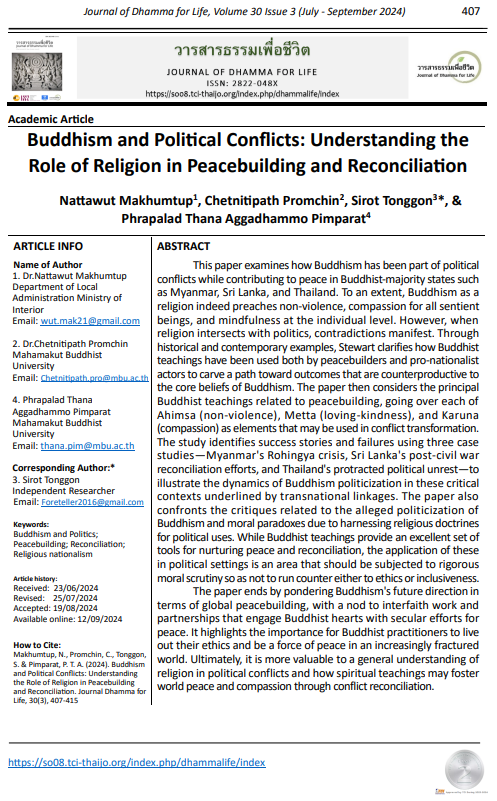Buddhism and Political Conflicts: Understanding the Role of Religion in Peacebuilding and Reconciliation
Main Article Content
Abstract
This paper examines how Buddhism has been part of political conflicts while contributing to peace in Buddhist-majority states such as Myanmar, Sri Lanka, and Thailand. To an extent, Buddhism as a religion indeed preaches non-violence, compassion for all sentient beings, and mindfulness at the individual level. However, when religion intersects with politics, contradictions manifest. Through historical and contemporary examples, Stewart clarifies how Buddhist teachings have been used both by peacebuilders and pro-nationalist actors to carve a path toward outcomes that are counterproductive to the core beliefs of Buddhism. The paper then considers the principal Buddhist teachings related to peacebuilding, going over each of Ahimsa (non-violence), Metta (loving-kindness), and Karuna (compassion) as elements that may be used in conflict transformation. The study identifies success stories and failures using three case studies—Myanmar's Rohingya crisis, Sri Lanka's post-civil war reconciliation efforts, and Thailand's protracted political unrest—to illustrate the dynamics of Buddhism politicization in these critical contexts underlined by transnational linkages. The paper also confronts the critiques related to the alleged politicization of Buddhism and moral paradoxes due to harnessing religious doctrines for political uses. While Buddhist teachings provide an excellent set of tools for nurturing peace and reconciliation, the application of these in political settings is an area that should be subjected to rigorous moral scrutiny so as not to run counter either to ethics or inclusiveness.
The paper ends by pondering Buddhism's future direction in terms of global peacebuilding, with a nod to interfaith work and partnerships that engage Buddhist hearts with secular efforts for peace. It highlights the importance for Buddhist practitioners to live out their ethics and be a force of peace in an increasingly fractured world. Ultimately, it is more valuable to a general understanding of religion in political conflicts and how spiritual teachings may foster world peace and compassion through conflict reconciliation.


